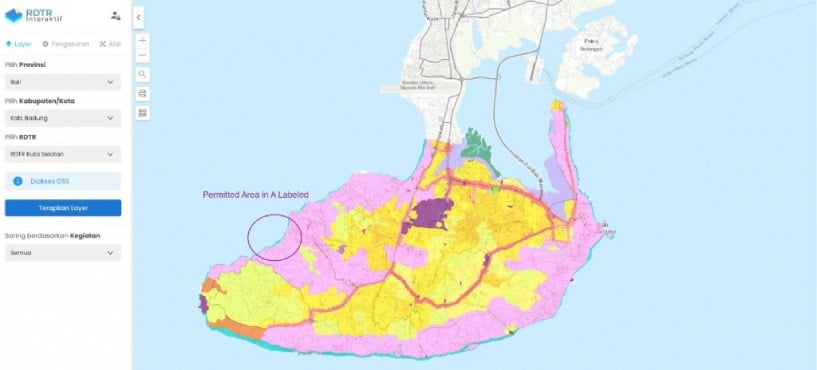Introduction
In Bali, land zoning regulations play a crucial role in maintaining the island’s balance between development and preservation. The zoning colors indicate the permitted use of land, which can significantly impact property investments and construction projects. This guide will explain the different zoning colors in Bali, their meanings, and what types of developments are allowed or restricted in each zone.
Section 1: Green Zone (Zona Hijau)
The green zone, or “zona hijau,” is designated for agricultural and conservation purposes. This zoning aims to preserve Bali’s natural landscapes, including rice fields, forests, and protected areas.
Characteristics
- Non-constructible: Construction of residential or commercial buildings is generally not allowed.
- Allowed Uses: Agricultural activities, such as farming and plantations, are permitted.
- Environmental Protection: These areas are crucial for maintaining biodiversity and ecological balance.
Section 2: Yellow Zone (Zona Kuning)
The yellow zone, or “zona kuning,” is designated for residential use. This is where most housing developments and residential communities are located.
Characteristics
- Constructible: Residential buildings, such as houses, villas, and apartment complexes, are allowed.
- Infrastructure: These areas are typically well-developed with essential infrastructure, including roads, utilities, and public services.
- Community Facilities: Schools, parks, and local shops may also be present in these zones.
Section 3: Red Zone (Zona Merah)
The red zone, or “zona merah,” is designated for commercial and industrial use. This zoning allows for the development of businesses, offices, and industrial facilities.
Characteristics
- Constructible: Commercial buildings, such as offices, shopping centers, and hotels, are permitted.
- Industrial Activities: Factories and warehouses may also be located in these zones.
- Business Hubs: These areas are often bustling with economic activity and provide numerous business opportunities.
Section 4: Other Zoning Colors
Blue Zone (Zona Biru)
The blue zone, or “zona biru,” is designated for tourism-related activities. This zoning supports the development of tourist accommodations and attractions.
Characteristics
- Constructible: Hotels, resorts, and other tourist facilities are allowed.
- Tourism Services: Restaurants, travel agencies, and recreational facilities may also be present.
- Promoting Tourism: These zones are essential for supporting Bali’s tourism industry.
Brown Zone (Zona Coklat)
The brown zone, or “zona coklat,” is designated for mixed-use development. This zoning allows a combination of residential, commercial, and sometimes industrial uses.
Characteristics
- Flexibility: Mixed-use developments, including residential complexes with integrated commercial spaces, are permitted.
- Urban Development: These zones support dynamic and diverse urban growth.
Section 5: Understanding Zoning Regulations and Permits
Before purchasing land or starting a construction project in Bali, it is crucial to understand the zoning regulations and obtain the necessary permits.
Steps to Follow
- Check Zoning Designation: Verify the zoning designation of the land with the local land office (Badan Pertanahan Nasional, BPN).
- Obtain Permits: Secure the required building permits and approvals from the local government authorities.
- Consult Professionals: Work with local architects, lawyers, and consultants who are familiar with Bali’s zoning laws and regulations.
Conclusion
Understanding the different zoning colors and their implications is essential for anyone looking to invest in property or undertake construction projects in Bali. Each zone has specific regulations that dictate the types of developments allowed, helping to preserve the island’s natural beauty and ensure sustainable growth. By following the zoning guidelines and obtaining the necessary permits, you can ensure that your project complies with local regulations and contributes positively to Bali’s development.





